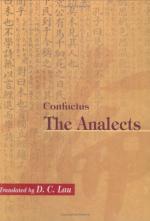|
This section contains 3,141 words (approx. 11 pages at 300 words per page) |

|
Confucianism originated more than 2,000 years ago in China in the thoughts of Confucius, or Kong Zi (Master Kong, 551–479 B.C.E.). Kong Zi lived during one of the formative periods of Chinese culture, when numerous philosophical schools, such as Daoism (Taoism) and Mohism, vied for social influence. Other major early thinkers in the Confucian tradition include Mencius, or Meng Zi (371–289 B.C.E.), and Xun Zi (298–238 B.C.E.). Confucianism was established as the state ideology during the Han dynasty (206 B.C.E.–220 C.E.). As an original thinker, a powerful persuader, and a successful educator, Kong Zi became the defining philosopher of Chinese culture and one of the most influential cultural philosophers in East Asia and beyond. In the early twenty-first century Confucianism stands for a distinctive voice in global dialogues on issues that range from human rights to gender equality. As a living tradition...
|
This section contains 3,141 words (approx. 11 pages at 300 words per page) |

|


